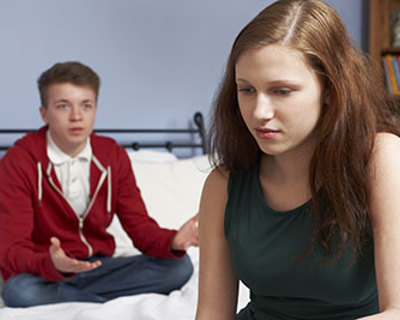Sexual development
Children's sexual development - advice for parents
As a parent you’ll know that children will gradually become aware of sex and sexuality at different ages and stages.
You might expect a pre-school child to ask questions about the differences between men and women or where babies come from. A primary school child may have ‘girlfriends’ or ‘boyfriends’ and copy adult behaviour like kissing. Older children will start to develop mature sexual urges and need advice and support from adults on how to manage these effectively.
What is ‘normal’ sexual development?
As you’ll know from your own experiences, there is no set thing that happens at a predictable time but rather a complex process of physical and emotional changes over time, and not just in the teenage years.
Whether we like it or not, sexual development starts from a very young age. Exploring our bodies as toddlers, asking questions about babies as pre-schoolers, these curiosities are the start of our child’s sexual development. The NHS has a clear and simple guide to what is expected and ‘typical’ at each stage.
What’s the best way to talk to your child about sex?
You know your child best, you know what stage they’re at and what you tell them is down to you. Here are a few pointers which parents have told us help:
- Start talking as early as possible, don’t wait until they’re 15 to ask if they’re thinking of sex.
- Be honest as much as you can (depending on their age and stage). It’s best not to tell them the stork delivered their baby brother (or any other magical explanations that are likely just to cause confusion!)
- Listen to them, and answer, no matter what age they are. Don’t dismiss their questions or curiosity (or they may feel unable to ask you the next time). If you take topics off the table then your child will seek their answers elsewhere.
- Encourage an open home which talks about sex, bodies, love – this way they are more likely to share anything (and possibly everything!) with you.
- Don’t change the TV channel or walk out the room when something sexual comes on – doing this will give the message that sex is secret and shameful.
- If you’re embarrassed – tell them you’re embarrassed. Being open and sharing your vulnerabilities and feelings will help them to do the same.
- For advice on talking about sexual orientation and gender identity, visit our page 'Supporting your LGBT child'.
- If you don’t know the answer to a specific question, tell them you don’t know but you could maybe find the answer together.
- Find some good websites that they can look at themselves too – sometimes they might appreciate your signposting rather than your chat.
- Use humour: it can help to cut through some of the anxiety and embarrassment if everyone can see the funny side.
Having open, honest and regular conversations about sex and the body can key to ensuring your child is safe, and confident to know what behaviour is acceptable and normal.


